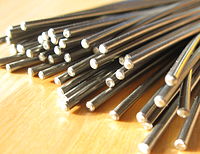
Photo from wikipedia
This study aimed to evaluate and compare the effects of ambient temperature and post-manufacture heat-treatment on the mechanical behavior of nickel-titanium (NiTi) wires. Four types of commercial NiTi variants (Stock… Click to show full abstract
This study aimed to evaluate and compare the effects of ambient temperature and post-manufacture heat-treatment on the mechanical behavior of nickel-titanium (NiTi) wires. Four types of commercial NiTi variants (Stock NiTi, heat treated “Blue”, “Gold”, “Superflex”, all Dentsply Maillefer, Ballaigues, Switzerland) were stressed in a tensile testing machine in a temperature-controlled water bath at three different temperatures. Stress and strain values were extrapolated from the raw data, and 2-way ANOVA and Tukey’s test for multiple comparisons were performed to compare the differences of the mechanical constants. Differential scanning calorimetry (DSC) tests established the martensitic transformation starting (Ms), finishing (Mf) and austenitic (reverse-martensitic) starting (As) and finishing (Af) points. Austenitic modulus of elasticity and transformation stress values increased with temperature for all NiTi groups. The martensitic modulus of elasticity, maximum transformation strain and ultimate tensile stress were not significantly affected by temperature changes. Stock NiTi and Gold wire samples presented with clearly delineated austenitic and martensitic transformations in the DSC experiments. Differences in manufacturing/heat treatment conditions and ambient temperature affect the mechanical behavior of nickel-titanium and may have clinical implications. Further improvements to the experimental setup could be considered to provide more accurate measurements of strain.
Journal Title: Materials
Year Published: 2022
Link to full text (if available)
Share on Social Media: Sign Up to like & get
recommendations!